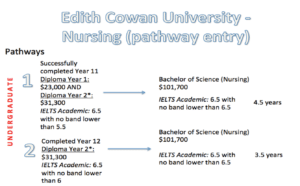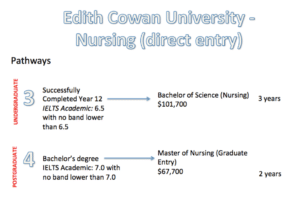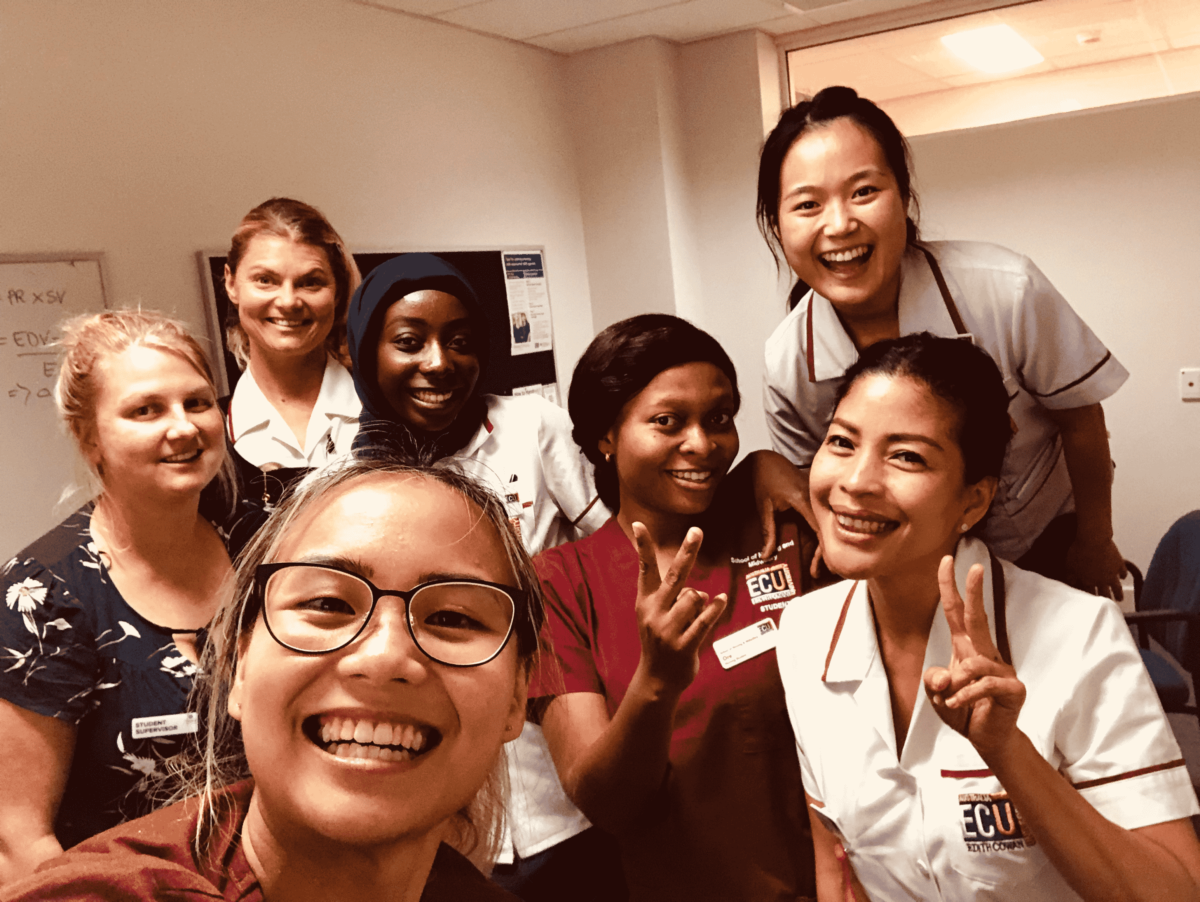Nursing has become an incredibly popular course for international students and nursing is a fast growing profession worldwide.
The college and university admissions (and AHPRA) requirements can be quite complicated, especially if you haven’t studied the standard foundation science subjects at high school.
Edith Cowan University runs the largest Nursing education program in Australia and has campuses with cutting edge facilities in Joondalup and Bunbury.
Fast Facts – Registered Nursing in Australia?
- An occupation in high demand
- Unemployment well below average
- Approximately 29,400 new job openings per year
- Weekly wage of around $1,909
- A fulfilling career helping others!
No two students are the same and so packaged pathways are issued on a case-by-case basis and nursing students are required to provide evidence that they meet minimum English language requirements at the time of application. You cannot package an English language course with a Bachelor of Science (Nursing). There are different ways to meet the academic entry requirements into a Bachelor of Nursing degree. Our team excels at helping you to navigate the entry requirements and will provide you with ongoing guidance and support on your visa pathways.
If you’ve ever dreamed of studying to become a registered nurse in Australia – read on!
Edith Cowan University

*Fees correct as of October 2019.
*ECC offers a 10% scholarship for Diploma Year 2 which brings down the fees to $27,170.
*Upon completion of a Diploma (Year 2), the units credited will also reduce the total tuition fee for the Bachelor’s degree.
*Pathways are an indication only. Final entry point, duration and course fees are at the discretion of the admissions team.
Edith Cowan College (ECC) is a direct pathway provider to degrees at Edith Cowan University (ECU).
A Diploma of Science (Health Studies) (Year 1) can help prepare you for your Nursing degree if you have completed Year 11 or equivalent in your home country. It is a stepping-stone for those who left high school early and need to complete certain units before they can access the Diploma (Year 2).
The Diploma (Year 2) can also be accessed directly if you have finished Year 12 or equivalent in your home country but do not have enough passes in your high school subjects, would like to commence in October as ECU only has February and July intakes or would simply like to ease you way into university life. After completion of Diploma Year 2, you will be exempted from up to 7 units thus you may be required to study only 2.5 years of your Bachelor of Science (Nursing).
To gain entry into the Diploma (Year 1, Year 2) you need to apply with an IELTS score of 6.0 with no band lower than 5.5 and 6.5 with no band less than 6.0 respectively. If you receive a packaged offer including the Bachelor of Science (Nursing), your offer will be conditional upon you presenting an updated IELTS score with an overall of 6.5 with no band less than 6.5 just before you commence your degree. ECC has an IELTS testing centre on campus which comes in handy when re-sitting your IELTS to meet the University Nursing English requirement.
If you successfully completed Year 12 in your home country, you may also be eligible for direct entry into the Nursing degree without having to do Diploma Year 1 or 2. Direct entry means you already have an IELTS of 6.5 with no band lower than 6.5 (unless you went to school in either Australia, Canada, New Zealand, Republic of Ireland, South Africa, UK or USA). Your high school certificate and transcripts results must also meet the academic requirements.
… If you already hold a Bachelor degree and want to become accredited by the Australian Nursing and Midwifery Accreditation Council (ANMAC) you may be able to skip the whole pathway and enrol directly into a Master of Nursing (Graduate Entry).
Your Bachelor (or even previous Masters) degree can be in any field and you must have obtained a weighted average mark of at least 60% or equivalent. It is also a requirement that you have completed a unit in human biology at tertiary level; however, this may also be met by completing a Health Science Preparation program. You will need to submit a personal statement and an IELTS result of 7.0 with no band lower than 7.0 with your application.

Potential post-study visa options
Temporary Graduate (subclass 485) visa
A large number of international students, will apply for a temporary graduate visa (subclass 485) at the completion of their studies. There are no employment or study restrictions on this visa, so it is perfect for international students looking to gain some work experience in Australia after completing their studies.
Employer-sponsored visas
There are currently three types of employer-sponsored visas:
- Temporary Skills Shortage (subclass 482) visa
- Employer Nomination Scheme (subclass 186) visa
- Regional Sponsored Migration Scheme (subclass 187) visa (about to disappear!)
Occupations on the ‘Medium and Long-Term Strategic Skills List’ (MLTSSL), which Registered Nurse occupations, can be used in connection with an application for these three visas. All applicants required registration with AHPRA and applicants for a 186 visa will require a positive migration skills assessment.
Applicants for the above visas require post-qualification work experience (two years full-time for the TSS visa and three years full-time for the 186 and 187 visas), which can put these visas so out of reach for many recent graduates unless they have previous relevant work experience. This is why the temporary graduate visa is great option.
Points-tested visas
The points-tested visas are different from employer sponsored visas because you cannot apply for them directly, you must receive an invitation first. Potential applicants for the points-tested visas need to submit an Expression of Interest (EOI) and may or may not receive an invitation to submit a visa application from the Department of Home Affairs. It’s a complex process. The complexities of the application process will be discussed in a follow up Blog.
This Blog is intended to provide a brief overview only of the pathways into a nursing degree.
We strongly recommend that potential international students get professional advice on their study options and visa pathways before embarking on a particular course of study. Our team specializes in providing top quality education and migration advice to international students. We want you to live your best life and achieve your full potential!
You are welcome to book a consultation with us or contact us here. We are here to help.

